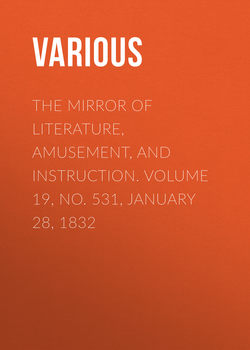The Mirror of Literature, Amusement, and Instruction. Volume 19, No. 531, January 28, 1832

Реклама. ООО «ЛитРес», ИНН: 7719571260.
Оглавление
Various. The Mirror of Literature, Amusement, and Instruction. Volume 19, No. 531, January 28, 1832
PONTEFRACT CASTLE, 1648
PONTEFRACT CASTLE
"LACONICS," GUESSES AT TRUTH, &c
THE LAW INSTITUTION.5
SPIRIT OF DISCOVERY
VAPOUR-BATHS
NOTES OF A READER
DECLINE OF THE DRAMA
EUGENE ARAM
THE NATURALIST
AGENCY OF MAN IN EXTINGUISHING OR SPREADING SPECIES
THE NOVELIST
THE CONFESSION OF SERVENTIUS
SPIRIT OF THE PUBLIC JOURNALS
SCENES FROM THE (OLD) FRENCH REVOLUTION
THE GATHERER
GUTTING THE FISH
FAMILIAR SCIENCE
Отрывок из книги
Pontrefact, a place of considerable note in English history, is situated about two miles south-west from Ferrybridge, nine miles nearly east from Wakefield, and fifteen miles north-west from Doncaster, in Yorkshire. The origin of the town is unknown; and the etymology of its name has been a matter of dispute, in which figures a monkish legend ascribing the name of Ponsfractus, or Pontefract, to the breaking of a bridge, and the fall of many persons into the river Aire, who were miraculously saved by St. William, Archbishop of York. The river Ouse and the city of York, however, put in a stronger claim as the scene of this miracle, and unfortunately for Pontefract, the town is so named in charters of fifty-three years' date before the miracle is pretended to have been performed. Still the etymology is referable to the breaking down of "some bridge," (pons, bridge; fractus, broken,) but this unravelment is not antiquarian. Camden says, that in the Saxon times, the name of this town was Kirkby, which was changed by the Normans to Pontefract, because of a broken bridge that was there. But as there is no river within two miles of the place, this bridge appears to have been built over the Wash, which lies about a quarter of a mile to the east of the Castle. Other researches prove Pontefract to have been a secondary and subordinate Roman station.
The history of the Castle is, of course, involved in that of the manor. The town is stated to have been a burgh in the time of Edward the Confessor; but how long it had enjoyed this privilege is uncertain.1 After the Conquest, this manor, with 150 others, or the greatest part of so many in Yorkshire, besides ten in Nottinghamshire, and four in Lincolnshire, were given by William to Hildebert, or Ilbert de Lacy, one of his Norman followers, who built the Castle. The work occupied twelve years, and it was finished in 1080. The labour and expense of its erection was so great, that no person unless in the possession of a princely fortune, could have completed a work of such magnitude. Hildebert was succeeded by his son Robert, commonly called Robert de Pontefract, from his being born at that town. Robert enjoyed his vast possessions in peace during the reign of William Rufus; but after the accession of Henry I. he with more ambition than prudence, joined with Robert, Duke of Normandy, the King's brother, who claimed the crown of England. In consequence of this transaction, Robert de Lacy was banished the realm, and the castle and honour of Pontefract were given by the King to Henry Traverse, and afterwards to Henry De-laval.2 Robert de Lacy was, however, restored after a few years exile, and the property continued in the Lacy family till the year 1193, when another Robert de Lacy dying without issue, the estate and honour of Pontefract devolved on his uterine sister Aubrey de Lisours, who carried these estates of the Lacys by marriage to Richard Fitz-Eustace, constable of Chester. Thence they descended to John Fitz-Eustace, who accompanied Richard I. in his crusade, and is said to have died at Tyre in Palestine. Roger, his eldest son, also in the crusade, succeeded to his honour and estates. He was present with Richard at the memorable siege of Acre. On his return to England he was the first of his family that took the name of Lacy, in which Pontefract Castle continued till 1310, when Henry de Lacy, through default of male issue, left his possessions to his daughter and heiress, Alice, who was married to Thomas, Earl of Lancaster; and, in case of a failure of issue from that marriage, he entailed them on the King and his heirs.
.....
Money was a wise contrivance to place fools somewhat on a level with men of sense.
It will be observed, that people have generally the identical faults and vices they accuse others of; we may instance cowardice.
.....